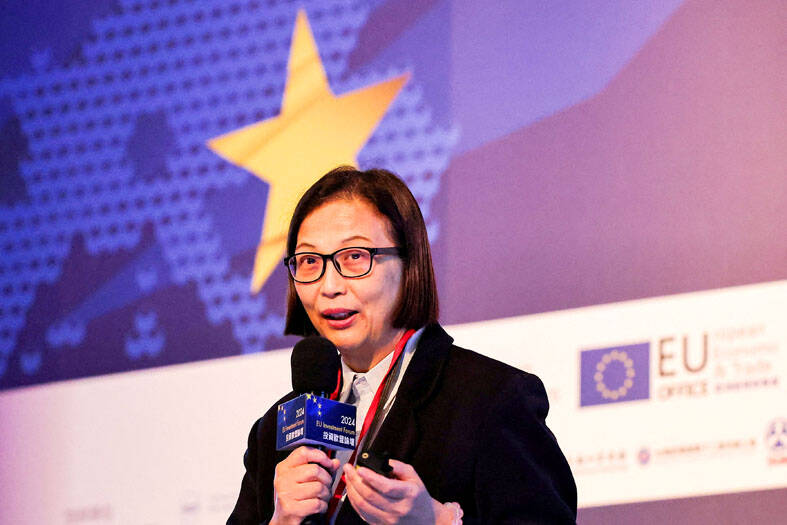GlobalWafers Co (環球晶圓), the world’s third-largest silicon wafer supplier, yesterday said it did not receive any notification from the US CHIPS Program Office regarding potential changes to funding conditions for the firm’s two new fabs under construction in the US.
The company’s remarks came amid speculation that US President Donald Trump is to review the CHIPS and Science Act subsidy requirements.
During his presidential campaign last year, Trump criticized the CHIPS Act and has said he favors tariffs over subsidies to promote the construction of manufacturing facilities in the US.

Photo: Ann Wang, Reuters
“We are not notified to review [the conditions] or to make any adjustments,” GlobalWafers chairwoman Doris Hsu (徐秀蘭) told reporters during an annual media gathering in Hsinchu. “Our strategy is to go global and provide locally made wafers to our customers. If we were really impacted by this, we will have to recalculate before making further investments.”
GlobalWafers would be well-positioned to offset any policy changes or potential tariffs by the US government than other semiconductor firms, given its diversification of manufacturing sites, including in the US, Hsu said.
Since 2022, GlobalWafers has invested in capacity expansion in the US, she said, adding that there were no plans to alter the investment project for the time being.
The company’s goal is to supply locally made wafers to foundry companies and chip designers in the US, which is in line with the US government’s policy, she said.
GlobalWafers expects the US Department of Commerce to disburse the first batch of funding later this year.
The company in December last year said that it would receive US$406 million in subsidies from the US government for two new US fabs under the act.
The grant represents 10 percent of the planned investments of US$4 billion in an advanced 12-inch silicon wafer manufacturing facility in Texas and a 12-inch silicon-on-insulator wafer plant in Missouri.
Those two factories are “essential” to bring chip manufacturing back to the US, Hsu said, citing US media reports.
The Texas fab is to start shipping wafers next quarter at the earliest, she said.
GlobalWafers yesterday also gave its outlook for this year.
“The first quarter would be the bottom. A more marked recovery should be seen in the second half of this year and a more brisk recovery in 2026 based on messages from multiple customers,” Hsu said, adding that demand for advanced silicon wafers is healthy this quarter.
The company expects a recovery for the rest of this year, Hsu said.
This year as a whole would be better than last year, she said.
Last year, GlobalWafers’ revenue declined 11.36 percent to NT$62.63 billion (US$1.91 billion) from NT$70.65 billion a year earlier, attributable to inventory correction and soft demand.

Anna Bhobho, a 31-year-old housewife from rural Zimbabwe, was once a silent observer in her home, excluded from financial and family decisionmaking in the deeply patriarchal society. Today, she is a driver of change in her village, thanks to an electric tricycle she owns. In many parts of rural sub-Saharan Africa, women have long been excluded from mainstream economic activities such as operating public transportation. However, three-wheelers powered by green energy are reversing that trend, offering financial opportunities and a newfound sense of importance. “My husband now looks up to me to take care of a large chunk of expenses,

SECTOR LEADER: TSMC can increase capacity by as much as 20 percent or more in the advanced node part of the foundry market by 2030, an analyst said Taiwan Semiconductor Manufacturing Co (TSMC, 台積電) is expected to lead its peers in the advanced 2-nanometer process technology, despite competition from Samsung Electronics Co and Intel Corp, TrendForce Corp analyst Joanne Chiao (喬安) said. TSMC’s sophisticated products and its large production scale are expected to allow the company to continue dominating the global 2-nanometer process market this year, Chiao said. The world’s largest contract chipmaker is scheduled to begin mass production of chips made on the 2-nanometer process in its Hsinchu fab in the second half of this year. It would also hold a ceremony on Monday next week to

TECH CLUSTER: The US company’s new office is in the Shalun Smart Green Energy Science City, a new AI industry base and cybersecurity hub in southern Taiwan US chip designer Advanced Micro Devices Inc (AMD) yesterday launched an office in Tainan’s Gueiren District (歸仁), marking a significant milestone in the development of southern Taiwan’s artificial intelligence (AI) industry, the Tainan City Government said in a statement. AMD Taiwan general manager Vincent Chern (陳民皓) presided over the opening ceremony for the company’s new office at the Shalun Smart Green Energy Science City (沙崙智慧綠能科學城), a new AI industry base and cybersecurity hub in southern Taiwan. Facilities in the new office include an information processing center, and a research and development (R&D) center, the Tainan Economic Development Bureau said. The Ministry

ADVERSARIES: The new list includes 11 entities in China and one in Taiwan, which is a local branch of Chinese cloud computing firm Inspur Group The US added dozens of entities to a trade blacklist on Tuesday, the US Department of Commerce said, in part to disrupt Beijing’s artificial intelligence (AI) and advanced computing capabilities. The action affects 80 entities from countries including China, the United Arab Emirates and Iran, with the commerce department citing their “activities contrary to US national security and foreign policy.” Those added to the “entity list” are restricted from obtaining US items and technologies without government authorization. “We will not allow adversaries to exploit American technology to bolster their own militaries and threaten American lives,” US Secretary of Commerce Howard Lutnick said. The entities